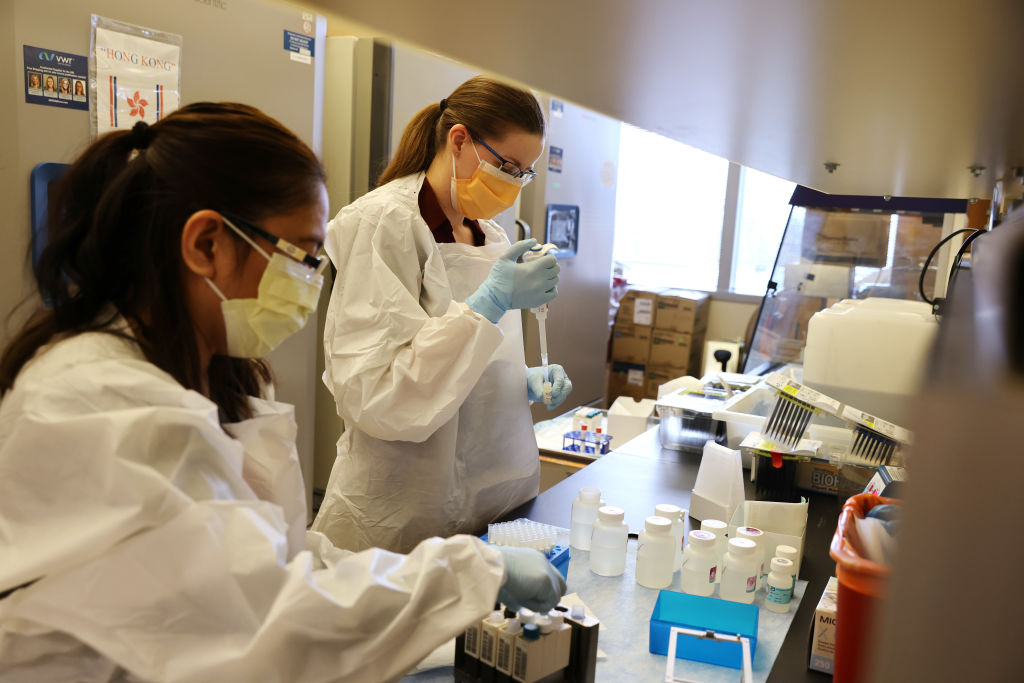3 'concerning' ways in which COVID could change


A free daily email with the biggest news stories of the day – and the best features from TheWeek.com
You are now subscribed
Your newsletter sign-up was successful
It's the question on everyone's minds — where is COVID-19 headed now? While such an outcome is nearly impossible to predict, there are, at the very least, three distinct, "concerning possibilites" in how the virus could "shift," writes The New York Times: "It could become more transmissible, it could become better at evading our immune system, or it could become more virulent, causing more serious disease."
As for the first possibility, COVID has already grown more transmissible, but scientists do believe there to be "some basic biological limits on just how infectious a particular virus can become," notes the Times. "There are just limits to that process," explained Dr. Jesse Bloom, a viral evolution expert.
When it comes to evading immune response, there's some good news, at least so far — "This virus is mostly playing by immunological rules we understand," said virologist Dr. Shane Crotty. In other words, the immune system also has its own "tricks up its sleeve" to handle the virus, even as it evolves. "Knowing that there is this complex level of diversity in the immune system allows me to sleep better at night," said immunologist Marion Pepper.
The Week
Escape your echo chamber. Get the facts behind the news, plus analysis from multiple perspectives.

Sign up for The Week's Free Newsletters
From our morning news briefing to a weekly Good News Newsletter, get the best of The Week delivered directly to your inbox.
From our morning news briefing to a weekly Good News Newsletter, get the best of The Week delivered directly to your inbox.
And as for the third possibiltiy — an increase in virulence — that's "the hardest to predict," scientists said. There is no "inherent evolutionary advantage" to virulence, per the Times, and it "only matters for the virus if it works for transmission," explained evolutionary biologist Dr. Jessica Metcalf. There might be "trade-offs" between the two phenomenons, but COVID may also be special in that the virus is able to spread before people become severely ill and isolate.
Although it's too soon to tell where exactly the "arms race" is headed, global health expert Dr. Jonathan Quick notes our future "depends much, much more on what humans do than on what the virus does."
A free daily email with the biggest news stories of the day – and the best features from TheWeek.com
Brigid Kennedy worked at The Week from 2021 to 2023 as a staff writer, junior editor and then story editor, with an interest in U.S. politics, the economy and the music industry.
-
 Minnesota's legal system buckles under Trump's ICE surge
Minnesota's legal system buckles under Trump's ICE surgeIN THE SPOTLIGHT Mass arrests and chaotic administration have pushed Twin Cities courts to the brink as lawyers and judges alike struggle to keep pace with ICE’s activity
-
 Big-time money squabbles: the conflict over California’s proposed billionaire tax
Big-time money squabbles: the conflict over California’s proposed billionaire taxTalking Points Californians worth more than $1.1 billion would pay a one-time 5% tax
-
 ‘The West needs people’
‘The West needs people’Instant Opinion Opinion, comment and editorials of the day
-
 Blue Origin launches Mars probes in NASA debut
Blue Origin launches Mars probes in NASA debutSpeed Read The New Glenn rocket is carrying small twin spacecraft toward Mars as part of NASA’s Escapade mission
-
 Dinosaurs were thriving before asteroid, study finds
Dinosaurs were thriving before asteroid, study findsSpeed Read The dinosaurs would not have gone extinct if not for the asteroid
-
 SpaceX breaks Starship losing streak in 10th test
SpaceX breaks Starship losing streak in 10th testspeed read The Starship rocket's test flight was largely successful, deploying eight dummy satellites during its hour in space
-
 Rabbits with 'horns' sighted across Colorado
Rabbits with 'horns' sighted across Coloradospeed read These creatures are infected with the 'mostly harmless' Shope papilloma virus
-
 Lithium shows promise in Alzheimer's study
Lithium shows promise in Alzheimer's studySpeed Read Potential new treatments could use small amounts of the common metal
-
 Scientists discover cause of massive sea star die-off
Scientists discover cause of massive sea star die-offSpeed Read A bacteria related to cholera has been found responsible for the deaths of more than 5 billion sea stars
-
 'Thriving' ecosystem found 30,000 feet undersea
'Thriving' ecosystem found 30,000 feet underseaSpeed Read Researchers discovered communities of creatures living in frigid, pitch-black waters under high pressure
-
 New York plans first nuclear plant in 36 years
New York plans first nuclear plant in 36 yearsSpeed Read The plant, to be constructed somewhere in upstate New York, will produce enough energy to power a million homes
